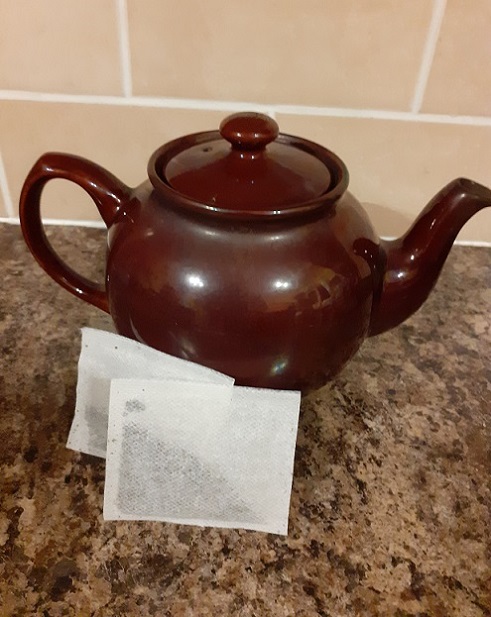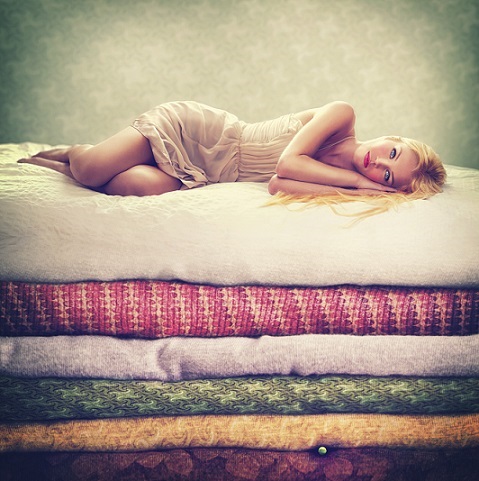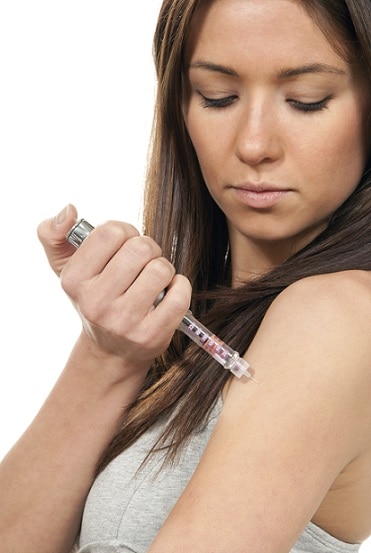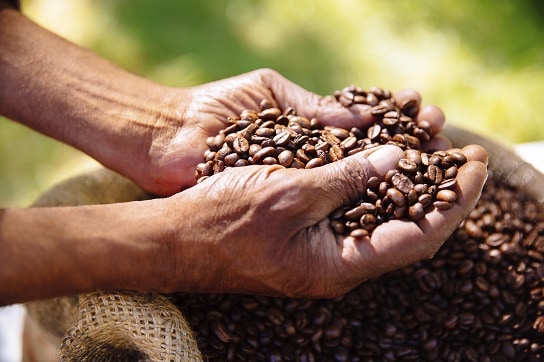
Caffeine is effectively the most popular drug in the world, as according to one study, 77% of students were regular drinkers of coffee. 66.67% of male students were regular drinkers, while females were even higher at 81%. Overall, 61% of the students drank caffeinated tea regularly, 43.8% drank caffeinated soft drinks, and 31.9% made caffeinated energy drinks a regular dietary staple.
Ever rising numbers of workers are swallowing pure caffeine pills, to get the coveted focus and stimulation without bothering with food. Maybe you’ve been doing the same. In this article, we therefore discussed whether coffee is safe for acne (hint: it is).
That said, coffee is not the only source of caffeine. The average cup contains 90mg or so, but teas range from 6-110mg, energy drinks contain 50-500mg per bottle, and even dark chocolate contains small amounts.
Today’s acne article will be simple then. We will discuss the three main acne dangers of caffeine, and why they’re easy to overcome with a little imagination.
DANGER 1 – stress hormone spikes
We’ll start with the negatives, and firstly, it’s completely true that stress causes acne.
In fact, it’s probably a top 5 cause, as the main stress hormone cortisol can lead to leaky gut syndrome, delayed healing of existing acne, and possibly oily skin by increasing insulin levels.
Why does this matter? Because the classic burst in physical energy from caffeine partially comes from a large cortisol spike. Caffeine stimulates your adrenal glands to release cortisol, and once inside the bloodstream, it pulls glucose directly from your energy stores and spikes your blood sugar.
ONE: this 2008 study found that after consuming 500mg of pre-workout caffeine, bloodstream cortisol spiked by 52%.
Read Annihilate Your Acne – learn how to clear your skin permanently
TWO: this 2006 study found that caffeine spiked cortisol equally in men and women: “Repeated caffeine doses increased cortisol levels across the test day without regard to the sex of the subject”.
Spiking cortisol is one of the caffeine’s most notorious effects, occurring in both chronically relaxed patients and stressed ones…
…but whether it leads to acne depends entirely on your circumstances. If stress and anxiety are your constant companions, then your cortisol will be elevated all day and you’ll need all the assistance you can get it in restraining it. Strangely, patients with higher blood pressure also had stronger cortisol reactions from caffeine (1998 study).
That said, cortisol is a necessary hormone. You need it for energy regulation and blood pressure control. You’ll never have no cortisol, and nor would you want to – the real problem is chronically elevated levels.
That’s why for acne, enjoying up to three cups of coffee per day won’t crank your cortisol levels up long enough to cause harm.
Better, you can time your coffee cycle perfectly to minimise the damage. All humans have a daily cortisol cycle, where levels are lowest at night to allow your neurotransmitters to induce sleep, and highest between 8am and 9am to pull glucose from your energy stores after 8 sleepy hours of fasting.
Consequently, if you drink your coffee just after this spike, between 9:30am and 11:30am, you can 1) preserve the precious low-cortisol period in the evening, while 2) avoiding gigantic early morning spikes.
Recommended – 6 vitamins and minerals which could finally clear your acne
One study even found that consuming coffee regularly gradually blunted the cortisol spike. It wasn’t eliminated totally, but it grew milder and milder within days, making it smart to keep your caffeine intake regular as well.
Conclusion – caffeine spikes your stress hormones, but the damage can easily be minimised
DANGER 2 – acne from poor sleep
Firstly, the dominant reason why cortisol is lower in the evenings is its potent effects on the human brain. Cortisol inhibits the all-important happiness neurotransmitter serotonin, a vital ingredient of the sleepiness hormone melatonin. Secondly, caffeine itself directly inhibits adenosine, the second most important neurotransmitter for sleep. This player reduces mental alertness, focus and energy, accumulating over the course of your waking hours to the point where the fatigue cannot be resisted.
Caffeine, meanwhile, blocks your brain’s adenosine receptors sites. It passes through your brain-blood barrier like a ghost.
Both adenosine and melatonin explain why caffeine keeps you up all night and therefore, they explain why caffeine can cause acne. Deep and restful skin is a must for clear skin – just one insufficient night can send your insulin metabolism, pro-inflammatory cytokines, and cortisol spiralling out of control.
Why bread and pasta are a massive cause of acne
Sleeping poorly one night can trigger a downward spiral where the cortisol spike wrecks your sleep the next night, and the next night, followed by ever-intensifying acne…
…but like the stress spike, this scenario is dead easy to avoid. Again, you simply have to drink your caffeine in morning. If you love coffee, drink it before lunch, or if you’re a fitness fanatic, down your energy drink and hit the gym with a vengeance in the morning.
Caffeine has a half-life of 6-8 hours in the brain, depending on your genetics. Caffeine lasts for 60 hours in the body overall, but if you leave a good 8 hours before hitting the sack, the residual bloodstream levels will be harmless. Then you can deploy some additional sleep promoting weapons such as darkening your room, eating carbs before bedtime, exercising more, or supplementing with magnesium.
Is your acne at monstrous levels? Is your skin grey and lifeless? Are you suffering from sleep deprivation?
Finally, do you stay up at night by filling yourself with copious amounts of stimulants?
If so, switching your caffeine intake to earlier in the day is an excellent acne strategy to follow.
DANGER 3 – high insulin and oily skin
Insulin resistance is disease where either 1) your insulin molecules are functioning ineffectively, or 2) your insulin receptor sites are malfunctioning. In either case, your body produces more insulin to compensate, and that’s a sure-fire recipe for oily skin, because insulin stimulates your skin’s sebaceous gland receptors highly effectively.
Caffeine has the power to increase insulin resistance, which is why many diabetics fear it.
ONE: in a randomised double blind study where 12 volunteers took caffeine, average insulin sensitivity fell by 15%. It was clearly caused by elevated epinephrine, a neurotransmitter which blocks insulin receptors, as levels increased five-fold.
TWO: after 16 patients aged between 16 and 22 swallowed 200mg of caffeine twice daily for 7 days, their insulin levels dropped substantially. The decrease persisted for at least a week and was evident for up to 12 hours after administration (2007 study).
It’s clear that caffeine cripples your insulin sensitivity both in the short term and long term, but once you understand the mechanisms, it’s not sinister at all.
One of the ways in which caffeine hypes you up so much is by increasing adrenaline. This increases lipolysis, the liberation of free fatty acids from body, which enter your bloodstream and provide you with a nice burst of physical energy. Making insulin less effective allows you to utilise those free fatty acids through exercise, walking, or other physical exertion. Otherwise, the insulin would recycle them back into your body fat stores, to the use of precisely nobody.
The truth about dairy and acne
Meanwhile, a massive 2006 study analysed 88,259 women aged between 28 and 48. Both decaf and regular coffee were associated with a lower type 2 diabetes risk, and so more importantly, so was caffeine. Type 2 diabetes is effectively an extreme form of insulin resistance, and if any food lowers the risk, then that’s an excellent proxy for boosting insulin sensitivity too.
Of course, the women’s caffeine intake could have correlated extremely tightly with coffee consumption, so next, the researchers processed the data to display caffeine intake independently. The benefits for type 2 diabetes then disappeared, but most importantly, no negative effects appeared either. The caffeine was resoundingly neutral.
Moreover, caffeinated coffee performed just as fantastically as decaffeinated, which wouldn’t have happened if caffeine was indeed an insulin disrupting monstrosity. Tea also had no connection with type 2 diabetes, both in low quantities and 4 or more cups per day.
Caffeine may damage insulin sensitivity, but the effect is clearly not long term. At high doses, it may persist for a few days (400mg was used in the study above, the equivalent of 5 cups daily), but there was none of the systematic destruction that a high carbohydrate diet can unleash.
Your mission is thus simple: yet again, you must keep your caffeine intake moderately low. Two cups of coffee daily will provide 160mg and that’s fine for acne.
You can also end the temporary insulin resistance by exercising. If you’ve downed some coffee and can feel the energy flowing, then use it! Run around the block, or drink some coffee before your daily walk.
Better yet, you can make your insulin system so laser sharp elsewhere that caffeine barely makes a dent. You can keep your carbohydrate intake restrained, eat more antioxidants to protect your insulin molecules, and take vitamin D supplements to boost the receptor function.
Conclusion: caffeine causes temporary insulin resistance, but this only leads to acne when seriously abused.
Why genes affect your caffeine sensitivity
The final weighty issue is the role of genetics. If you type “coffee and acne” into google, the testimonials are divided into two groups: 1) acne patients who swear on their life that they break out like clockwork, and 2) people who simply laugh and claim that they can down endless energy drinks and coffee cups without the slightest pimple.
What explains this phenomenon? The obvious conclusion is genetics.
Your race, your sex, and plain old genetic variance can all affect caffeine’s half-life in the body. 95% of caffeine gets broken down by your liver, but this process relies on a gene called CYP1A2. Moreover, many other genes support the activity of CYP1A2.
Hence, while the average half-life of caffeine in the human body is 5.7 hours, many drinkers have half lives as long as 10 hours. The consequences are profound: the cortisol spike lasts for longer, sleep disruption becomes more likely, and insulin sensitivity stays impaired for longer.
A lack of CYP1A2 and its friends can even cause allergy-like symptoms from caffeine, including anxiety, dizziness, fatigue, and chest pain…
…and according to this highly informative website, the number one symptom of a caffeine allergy is skin problems. Acne, rashes, severe itching, eczema, and hives have all been documented.
This 1999 study shows the genetic influence well:
- Some scientists interviewed 1943 individual female twins about their experiences with caffeine, including 486 monozygotic (identical) pairs and 335 dizygotic (non-identical) pairs. The results were striking: caffeine tolerance, withdrawal symptoms and acute symptoms were far closer in the identical twins. Between 35% and 77% of reactions were estimated to be genetic in nature. The scientists concluded that “individual differences in caffeine use, intoxication, tolerance, and withdrawal are substantially influenced by genetic factors.”
What does this mean? If YOU notice acne, regardless of stress, sleep, or spoonfuls of sugar in coffee, then you too may have a genetic sensitivity to caffeine.
The various caffeine-containing foods reviewed
Here’s a time old rule: caffeine is not caffeine is not caffeine. A cup of coffee and a monster energy drink are wildly different in their effects on acne. While the studies above tested isolated caffeine, it never works that way in nature.
For example, this study noticed that feeding caffeine to human volunteers blocked their vitamin D receptors. That would be dire news for acne, but this study later found that Saudi adolescents who drank 11 cups of coffee daily had the highest vitamin D activity. Problem solved.
The reality is that coffee, melon or dark chocolate contain an endless procession of natural compounds, with endless indirect effects on acne. It’s always impossible to judge a food using one isolated compound.
Some caffeine-rich foods are excellent for acne whereas others are dreadful.
Tea – all tea varieties contain a range of antioxidants, but one that’s especially famous is epigallocatechin-3-gallate (ECGC). This study analysed acne specifically, and noticed substantially lower levels after ECGC treatment. ECGC has the power the downregulate NK-KappaB, a master molecule of inflammation which controls many immune system cytokines. Green tea and white tea rule the roost for ECGC, and luckily, they contain the least caffeine per cup:
Black Tea: 23 – 110 mg
Oolong Tea: 12 – 55 mg
Green Tea: 8 – 36 mg
White Tea: 6 – 25 mg
Drinking tea has also been linked to a healthy heart, despite caffeine’s supposed link to cardiovascular disease.
Coffee – the number one source of antioxidants for the average American. One well-produced cup scores a weighty 16,000 on the ORAC scale (pomegranate=10500, blueberries=4669, broccoli=1510). Other medicinal compounds detected in coffee include lignans, quinides, antioxidants, dipertenes like kahweol and cafestol…
One of them, chlorogenic acid, is well known to improve insulin sensitivity (study), and therefore oily skin. Likewise, drinking coffee may slash the risk of diabetes. Coffee isn’t a perfect beverage (see this article), but it’s a good food for acne overall.
Caffeine pills – basically pure caffeine, assuming there are no acne-causing additives. Treat these things with the exact strategies we’ve covered so far. Be warned though – the doses are sky high. A typical pill is a 200mg bombshell. That’s easily enough to cause acne (and maybe heart palpitations) if you’re sensitive. They also lack any bonus antioxidants as the caffeine isn’t derived from whole foods.
Energy drinks – avoid. Newfangled “monster” energy drinks now contain 500mg of coffee per bottle, the equivalent of 6-7 cups of caffeine. A 2014 study found that nearly 20% of energy juice drinkers experienced heart palpitations and nearly 30% reported “weekly jolt and crash episodes”.
Making matters worse, energy drinks are sometimes dripping with 30 grams of sugar per bottle, often in the form of high fructose corn syrup, which is badly balanced towards fructose and contains a horrific pesticide called glyphosate which is the arch enemy of healthy gut bacteria. Even if your muscles are craving fuel, you’d be better off downing gallons of coffee and its bountiful antioxidants.
Consider that yogurt, an acne-friendly food which is full of useful bacteria, turns quickly to inflammatory junk when you pour in added sugar. The opposite is also true: a troublesome ingredient like caffeine can be neutered when a food has plenty of antioxidants.
Conclusion – your acne-friendly caffeine strategy
 Caffeine is not the devil itself like alternative medicine activists make it out to be. Yes, it can cause heart palpitations and tremors, but caffeine is also neuroprotective in the brain.
Caffeine is not the devil itself like alternative medicine activists make it out to be. Yes, it can cause heart palpitations and tremors, but caffeine is also neuroprotective in the brain.
For acne, caffeine is dead simple. Firstly, restrict your intake to two or three cups of coffee per day, depending on your individual reactions. Secondly, to control your stress and sleep quality, consume your caffeine before lunch or at least eight hours before bedtime. Thirdly, get your caffeine from tea and coffee, to pile in additional acne-clearing compounds.
There are three circumstances in which I’d recommend avoiding caffeine entirely. Number one is if you’ve had personal experiences hinting at poor caffeine genetics. You should never underestimate the carnage that food allergies can unleash on your acne.
Secondly, you should drink no more than 100mg a day if you’re chronically sleep deprived. Caffeine’s half-life is 8 hours, but by nightfall, 30-40mg could remain in your bloodstream. Finally, the same principle applies to chronic stress.
Don’t fear caffeine. Energy drinks are a joke, but coffee and tea are bursting with acne-clearing compounds, flavonoids and lignans. It’s worth becoming a master caffeine-hacker just to enjoy them.
NEXT: forget creams and moisturisers – discover the ultimate acne-clearing diet
Thanks for reading!




somewhat maybe taking too much of coffee in a day causes acne, I have notice this before so I lower my intake of coffee and my acne slows down.Though there are lots of reasons why we have acne breakout but I suggest lower the coffee intake.
Lower it = smart suggestion, but you don’t have to abolish it.
@Richard Wolfstein, half-assed decisions are for half assed-people
Why are you mentioning that here?
It varies, as everyone’s body has a different response. My concern is more with the pesticides and mycotoxins, in addition to the insulin resistance affects, which more than offset any partial or complete benefits that the coffee may provide.
Often though, people forget about the other items put in the coffee like creamers, sugar, etc. These can also compound the negative aspects while providing little, if any, positive benefits.
Thank you for this excellent article.
True, but mycotoxin levels vary in coffee AND the sensitivity to them varies among people. In some coffee will be a net benefit for acne, in others it will increase inflammation. That’s all assuming that you don’t pour way too much sugar in, like you said (raw honey is the top sweetener for acne).
Me- 10 am I have a single cup of coffee, medium strength. Later in the day, I have a cup of tea, lets say green or a weak cup of black tea. Me at 8 pm- Wired. The caffeine genetics makes so much sense to me.
My skin isn’t great when I drink coffee, but overall I have less depression and higher energy levels (obviously). Coffee is great for me in many ways, so I have to weigh the pros and cons. It would be great if people who were sensitive to caffeine also didn’t have depression or busy lives, and could just cut caffeine completely… but that isn’t reality. Sometimes it may be worth keeping your intake at the lowest level to still get the therapeutic benefits. Drink lots of water and invest in a good face wash.